- Home
- Ian Wallace
A Voyage To Dari Page 17
A Voyage To Dari Read online
Page 17
The last-ditch possibility was that Tannen, unable to find a synthesis, would nevertheless be able to perform the ceremony and (as chief) impregnate the bride within a few more than forty-eight horns from now; in which case there might be a child—but co-fathered with Croyd, not by Hanoku, but by Tannen.
In sum: Hanoku and Djeel must be rescued for themselves; but also, they must be rescued so that their marriage could be consummated somewhen between now and little more than forty-eight hours from now. If now with synthesis, then co-fathered by Hanoku; if in two days without synthesis, then co-fathered by Tannen; if in two days with synthesis—or later in any case—then Croyd would lose a half-child whom, now he thought about it, commandingly he valued.
Much as Croyd prized Tannen as a friend and as a man, Tannen’s co-fathering would be not even second-best for Djeel and Onu, because Onu would be crowded out.
But Tannen would find a synthesis.
Wouldn’t he?
Should he?
The voice of Dzendzel said, dead, “Croyd.”
Gradually he returned from the infinity of his prayer state.
“Croyd,” said again the dead voice.
He grasped that it came from above. He uttered, “You do not sound like God.”
“Who knows how God sounds, or whether I am He? Meanwhile, my Djinn name is Dzendzel.”
“That is what I figured.” Croyd was all alert now.
“You are a remarkable man, Croyd. I confess that I could not resist coming to observe you in my favorite dungeon keep. I suspect that I can guess what your mind has been doing.”
“Prior to my prayer, you mean?”
“You tried with the strength of your merely human mind to overcome your prison. Failing, you began to torture yourself with imaginings of what you might have done to your prison had I not stolen your power.”
“Apart from your reversal of the time order, my liege, you are absolutely right.”
“And so you have been praying, have you, Croyd?”
“I have been following your recommendation, my liege.”
“Praying against tomorrow, probably?”
“Against tomorrow.”
Hesitation. Then: “A while ago you suggested a debate with me.”
“For me this would be a pride.”
“It would be silly to debate; a purified feudalism is what I have settled for because it is the best social structure. Nevertheless, I would consider it an honor if you would consent to observe my purified feudalism in action.”
If you pray hard, you get an unprayed-for opportunity. Croyd murmured, “Enchanté."
Whereupon the ceiling above his head, at the silent will of Duke Dzendzel, converted itself into a circular sloping ramp down to the floor.
THEY FLOATED HIGH above a glowing metropolis of intricately interwoven streets and buildings, and the streets were clotted with glowing, swift-moving people.
The spreading of the city extended as far as he could see in any direction; its horizons curved upward in all but two directions, losing their upwardness in distance. Actually he was too high to distinguish individuals; yet somehow he knew that the multiplex darting glow on the streets was small, busy people.
“They are,” said Dzendzel beside him, “in a few cases my vassals and the vassals of Childe Roland, and in all cases my subjects. Contemplate the city, Croyd. Study the city; it is feudalism perfected.”
A voice profoundly sounded in Croyd’s mind: If you can comprehend the city, you can rule us. It was not the voice of Dzendzel.
He concentrated on the city, trying to understand it as an iridescent map. Presently his attention was drawn to the main artery of the city with its curiously paradoxical orientation. Hundreds of side streets were irregularly tributary to this boulevard; and every street that he could see was tributary to a tributary or to a once-or twice-removed tributary to this boulevard. The glow of moving people on the side streets became dense radiance on this boulevard. But whereas every place else the city was concave, dishing upward toward horizons, this boulevard through the valley of the city was convex, curving downward until at its horizons it disappeared.
Was the boulevard with its brilliance and its paradox another deceptive diversion? He felt that it was not, that this was some kind of reality, some element of a prime nature that he must know to find its place in the total solution. To the Lord of the Fissure he remarked without emphasis, “For beauty, it is thrilling; for feudal appreciation, I should descend closer.”
“Done,” said Dzendzel. The city began to rise toward Croyd, or perhaps he was descending toward the city; it was impossible to distinguish. Dzendzel added, “For this while, Croyd, it is unnecessary for you to request action from me; will whatever action you will, and your will becomes our action.” And indeed, the mutual approach between himself and the city felt as though he were willing it and therefore doing it. “When one walks, how does one walk?” he asked himself with seeming irrelevance, only it was relevant; once having learned to walk, just in this manner he merely willed to walk, and walked—with his legs either thrusting his body toward the goal, or turning his planet beneath him like a great ball floating in water in order to rotate the goal toward him.
This boulevard should be explored systematically. Croyd (with Dzendzel tacitly assenting) therefore overflew it, or else like the planet ball he turned it, to one of the downward-vanishing extremities. The end of it simply petered out into gray; very few people were visible at this lone end; and as one of the people approached the street end, his glow rheostatically diminished until he lost visibility; perhaps he walked off, perhaps not.
It seemed important to return, overflying the length of the great boulevard. At a height of perhaps twenty meters (with Dzendzel silent beside him), Croyd went back over the entire length, intending to return more slowly at lower altitude. During this overflight, several gross features came to his attention.
First, at this height, the people seemed to be human; either Erth’s Homo sapiens (which of course had spread to many planets), or his own Nigelian-human species known as croyd Thoth, or the Darian-human species called Meria melans, or some other human species. (He was thinking human, of course, anthropocentrically; and many planets had independently evolved species that were humanoid in that sense; in ethical definition, the term human transcended anatomy.)
Second, this boulevard indeed lay in a valley. The buildings (were they buildings?) on both flanks were nondescript gray; none of them rose as high as his altitude; their roofs were rounded rather than squared or pointed. These buildings looked soft; and they had no windows and perhaps no doors, yet people seemed to be going in and out of them at will.
Third, the brilliance of the collective people-glowing progressively grew until it crescendoed at what appeared to be about midway along the boulevard, then went into diminuendo as he moved on toward the far end, then reached a kind of pulsating secondary crescendo as he attained the peter-out into gray nothing. He recalled that the same sort of secondary pulsation had characterized the other end.
Fourth, the very long boulevard was divided into long segments—he had counted thirty-two. And yet the segments were not demarcated in any geometrical way—not, for instance, by tributary streets—but rather by a kind of people-clustering: one would say that there had been thirty-two people clusters.
He paused at the far end, at the edge of gray. He considered. There was something hauntingly familiar about this boulevard, its valleyness, its low-budding softness, its thirty-twoness. It was like no city he had ever inhabited or visited; nevertheless, somewhere he had.
Croyd remarked, “I want to retrace your boulevard, Lord—more intimately, this time.”
Dzendzel responded, purring, “My pride. I am yours tonight; you are mine tomorrow.”
Croyd descended to an altitude of three meters above the pavement, whence he could inspect individual people as they went about their incandescent pulsation and their convulsive business.
In this segment
, as in every segment, there were uncountable numbers of people; and the glow of each person was like the glow of a firefly—dark for a while, then suddenly leaping into life, then fading.
He tried to pick out one person for study. At first it was hard to do because of the swiftness of their movements. At length he perceived that each person paused motionless for a moment and glowed, then moved a distance with great swiftness, then paused to glow; whenever there was a pause and a glow, two people were meeting. He had to consider them, not by ones, but by twos. Presently he picked a random spot on the boulevard to focus on, and waited for two people to pause and glow together in his focus.
By a method that many normally intelligent people learn, he was focusing his interior thoughts while scrambling his exterior thoughts so that the Lord of the Fissure could not easily discern by telepathy the direction of his central thinking.
Two paused and glowed in his focus. Their stomachs and intestines were gigantic and external, pendulous outside their bodies. They faded and moved on.
Croyd mentally blinked, and shook his head, and picked another spot. Two more glowed there; again, stomachs and intestines external. They faded.
None of these people paid any attention to Croyd or to Dzendzel above them.
Croyd made a cheap generalization that external viscera must be characteristic of these people. Perhaps a sampling in the next segment would confirm it. He drifted, stopped, picked a spot, and waited.
Two people met, glowing. Their stomachs were properly unseen; what protruded was their pharynxes, outside their throats. They vanished.
Having checked one more case pair with external pharynxes, Croyd began to revise his hypothesis in rather an exciting way. Moving on to the next segment, he found that the people there looked commonplace except that their tongues were gigantic and protrusive. In the fourth segment, teeth and gums extended inches beyond lips. In the fifth segment, lower lips were Ubangi; in the sixth, both lips were vastly pendulous; in the seventh, upper lips hung entirely over mouths; in the eighth, astonishingly expanded faces were larger than heads; in the ninth, the noses were super-Cyrano; and in the tenth segment—the high point of the boulevard’s brilliance, where people met most often and glowed most radiantly—everybody seemed to be suffering from a complication of ophthalmic goiter with optic gigantism.
Brows heavy-down, Croyd continued his deliberate overflight; and by now, in terms of his hardening hypothesis, he was predicting the deformities segment by segment along the boulevard. Successively he observed abnormal enlargement of brow, thumb, index finger, middle finger, ring finger, little finger, hand, wrist, forearm, elbow, arm, shoulder, head, neck, trunk, hip, leg, knee, ankle, foot, and toes. And as he returned to the jump-off end of the boulevard, at the gray-off place where he had started, he observed without surprise that the male and female inhabitants of this disreputable way-out quarter were loin-bare and possessed of the most magnificent genital spears or targets that he had ever seen; and he noticed also that their bright-glowing encounters were more intimate than those in any other segment.
And now his hypothesis was hard! He knew what the boulevard was!
His intuition had been right: the main boulevard was an essential part of his comprehension, but it wasn’t all of his comprehension. The hinterland of small interlacing streets was just as important
Any part of this hinterland?
Yes, basically; but best of all, one particular part of this hinterland.
To reach this particular part, which side of the boulevard should he penetrate?
On a hunch, he flew back arrow-swift to the second-last segment, where the people with the enlarged pharynxes dwelt.
He watched a number of encounters, examining with care the pulsations of their pharynxes. When a person is swallowing, each pharyngeal action stimulates a pharyngeal sensation reaction lower down in a wavular chain reaction. Then when two people would meet in this boulevard segment, it would be instructive to watch exactly where in their pharynxes the main enlargement would be. The stimulating person should have his enlargement a bit higher in the pharnyx then the person he stimulated. And if most of the stimulating people were coming from one side of the boulevard, while most of the stimulated people were coming from the other side, this would give Croyd the orientation he needed.
It was true. Most of the stimulating people came from one side. And that side he now wanted to examine in its hinterland.
But Duke Dzendzel intervened. “Back to jail, Croyd,” he taunted. “And there you can tell me how you like my perfectly, feudal city.”
The cell whither Dzendzel now brought Croyd was not, however, the dungeon keep; instead, it was a heavydoored circular room in the third story of a lofty tower, with a barred window having no glass; full moonlight, arranged by Dzendzel flowed inward through this window, patterning on the stone floor in a cool white barred splash that was sufficient to make Dzendzel’s face quite clearly visible. A cot chorded an arc of this wall, a pot dotted another, a crude table with a basin and pitcher gave dull character to another. Croyd and the duke stood facing each other near room’s center, not two meters apart Croyd demanded, “Why this instead of that?”
“Because Childe Roland admires you.”
“Childe Roland issues orders to his liege?”
Dzendzel grinned. “Certainly not. My monarchy is absolute; it is the only way to run a feudalism. However, absolutism has its limits which a wise tyrant will respect. With a great vassal such as Roland, if one enforces every whim upon him, one loses that vassal’s enthusiasm. He will continue to obey, but lethargically. I prefer that Roland obey with intensity, desire, and conscience. Therefore I usually grant his whims, and this is one of them. When occasionally I say no, he accepts, and we go on.”
“Then, Dzendzel—since he admires me for some reason —he has expressed a whim to have me more comfortably quartered?”
“Somewhat more than that. Pray look out your window.”
Having studied the duke’s face, Croyd turned and went to the window, whose sill was at waist height. Moonlight made it unmistakable that the courtyard area below was a jousting area, complete with spectator pavilion and (in center court) the long rad-aisled lists in which lanced knights drove at each other. These lists at least were no anachronism; their time was matched with the Gothic motif of the castle, even though the level of relatively pure feudalism had long been superseded by the beginnings of anarchical nationalism at the time when lists had been invented.
Behind him, Dzendzel gloated, “Is it not admirably like the time of your King Arthur?”
Arthur had been an erthling, Croyd was not by origin an erthling; but even accepting “your King Arthur,” authentic Arthurian it was not, but rather, thirteenth-century Malory Arthurian, seven centuries later than the short-lanced leather-armored bareheaded time of the real Arthur. Nevertheless, in politeness: “It is admirable,” Croyd assented, turning. “Tell me why I am quartered above this admirability.”
“Roland has requested a morning joust with you. Because of your modern inexperience with such matters, I thought it might be a favor to quarter you over the lists, where you could spend your night figuring out precisely what you would be facing in the morning.” Dzendzel advanced. “Let me point out the details and what happens in terms of each detail.”
“Unnecessary; I know the details.”
Dzendzel stopped short. “You . . . know the details?”
“I know them vicariously, but thoroughly.” Vicariously was a euphemism; Croyd had checked out this sort of thing in Erth’s uptime; but since he hadn’t really been there in its vitality, in a way his check-out had been vicarious.
Up came Dzendzel’s chin. “Vicariously? Then you have not actually experienced the lists?”
Not these thirteenth-century-type lists. Much earlier-type jousting. Nevertheless: “I have not. But I understand them; you need not explain. In the morning I am to compete?”
“With Roland.”
“He is dan
gerous?”
“He is invincible.”
“This, however, will delay my scheduled brain scan?”
“Should you be subjected to brain scan tomorrow, I would have it intensified to make up for the delay.”
“Why do you phrase it in the conditional?”
“Should you by some remote chance defeat Roland or fight him to a draw, we would grant you a boon that you would be able to enjoy until early the following morning; and then there would be the brain scan.”
“I note that you phrase this also in the conditional.”
“Of course. The possibility of this outcome is just nidderingiy real; its improbability is overwhelming.”
“I will have arms and armor?”
“Of your choice.”
“And a mount?”
“Of your choice.”
“My choice out of your stable?”
“Your choice absolutely. We can furnish anything alive out of any era of any planet.”
“Nevertheless, I am sure to lose?”
“Whatever arms and armor and mount you may choose, the arms and armor and mount of Roland will be beefed up to equal them. It will therefore be equally you against Roland. And he will win.”
“He may even kill me?”
“If he kills you, we have means to keep your brain entirely vital until the brain scan; but in such case, being actually dead, you would feel no pain—so for you it would be better to let Roland kill you.”
“Roland would not want me to let him kill me. Or even to let him win.”
“That is between you and Roland. I do not care. However it may come out, the spectacle will be diverting.
I had not hoped for so much.”
“Should he kill me, you would be deprived of the pain-subjective spectacle of my brain scan.”

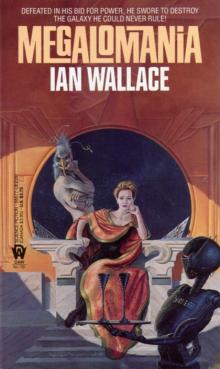 Megalomania
Megalomania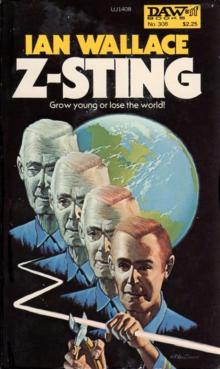 Z-Sting (2475 CE)
Z-Sting (2475 CE)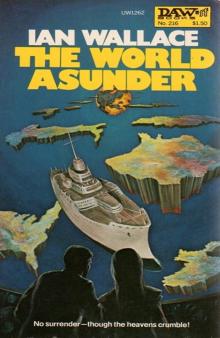 The World Asunder
The World Asunder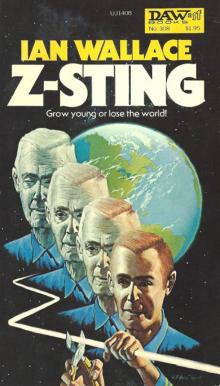 Z-Sting
Z-Sting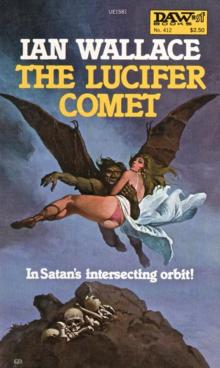 Lucifer Comet (2464 CE)
Lucifer Comet (2464 CE)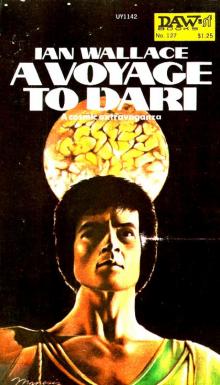 A Voyage To Dari
A Voyage To Dari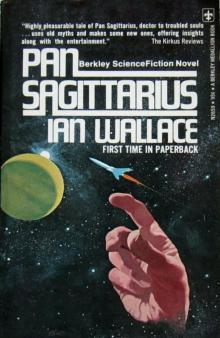 Pan Sagittarius (2509 CE)
Pan Sagittarius (2509 CE)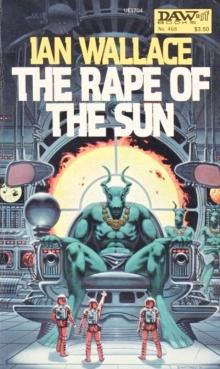 The Rape of The Sun
The Rape of The Sun